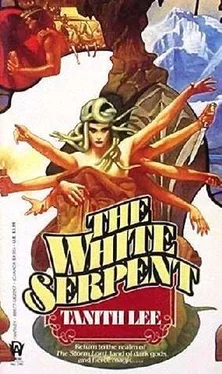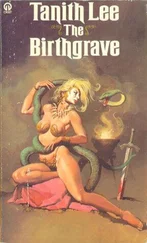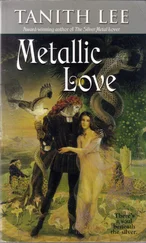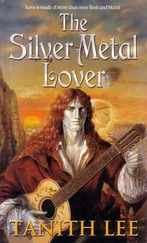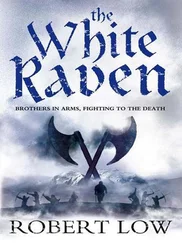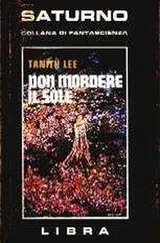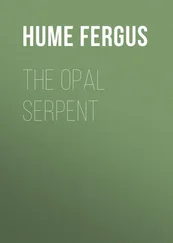Tanith Lee
The White Serpent
In a cone of purple dusk, on the white snow, the young woman stood calling in her husband’s dogs. All around, the mountains stared at each other across the valley, colored like the sky and darkening with it, the huge snows caught on them in broad luminous tangles. It was the heart of winter, yet as sometimes happened here in the west, there had been a partial thaw. Panes of ice slipped from the mountain sides and crashed away. A single flower had raised its head against the well—and Tibo plucked it and put it in a crock beside the hearth-fire. Transparent as a ghost it poised there, for Orbin to sneer at. The dog-pack, too, was loosed from its shed and let go up the valley. The dogs might catch a hare or unwary rock-rat out to forage in brief sunshine. By afternoon, however, snow-cloud came down again on the mountain tops and Orbin snarled a command. So Tibo left her pots and went to summon the dogs, with a high-pitched warbling woman’s call used the Iscaian uplands over.
Soon, they came trotting out of the mauveness one by one, two by two. She counted each as it passed her, and spoke kindly to it. All had returned empty-mouthed, though maybe they had found something for themselves. When the eighth dog had run by her and into the shed, Tibo scanned the dusk, and presently called out again. Orbin owned nine dogs and one had not come back, the dark bitch. Blackness.
Sometimes tirr prowled through the mountain valleys, if winter had caught them. A dog did not stand much of a chance against tirr venom. Nor against a fresh snowfall. Blackness was valuable, a clever huntress, whose womb made healthy pups. Tibo was concerned for her, and besides would get the blame if any animal were missing. Orbin badly wanted an excuse to give her a thorough beating.
There was perhaps a quarter hour of the twilight left, and new snow had not yet begun to come down. Tibo shut the dogs in. Then she took a lantern from its hook above the dog-shed door, kindled it, and began to walk out carefully across the pasture, calling as she went.
The ground was treacherous, not yet frozen hard again. Tibo knew from years of experience how unevenly the land lay under its disguise of snow. She knew also that a woman’s life was cheap, that Orbin hated her and that Orhn—well. There was no point in considering Orhn’s opinion on the matter.
She had been wed to him at the age of ten. Her family, a sprawling herd of many rough sons and many slavish daughters, had been no happiness to her, and she was early on acquainted with poverty. Orhn’s farm was spoken of with jealousy, his father had had some standing in the village of Ly; even his sons being given the names of Kings. This father was gone by the time of the marriage but the mother still lived, senile, vaguely demented, and chair-bound, for whose every need Tibo must care. Otherwise there were only the brothers to tend. Orbin’s two wives were both of them dead and a decline in fortune had, it seemed, prevented him from getting others. Orhn meanwhile, as Tibo discovered, was simple. He treated her gently enough, and in their nuptual bed, the garlands of flowers and vine still on their hair, had pawed and drooled upon her, expending his seed in the first minute, without union, or even an embrace. This had been the format of their coition ever after, though in later years the spark of lust had died in him, except now and then at Zastis. All of which meant, additionally, that Tibo had been some nine years a childless wife, apparently barren, which lowered her value further.
Altogether, she was worth very little, and had better find the dog who, undoubtedly, was worth much more.
A low wall of stones bounded the pasture, where in summer Orhn’s blue pigs and whippy-necked fowl rooted and pecked. An open place in the wall, where the dogs had come through, gave on a tumble of rocks, and a few citrus trees, whose leaves the cold had burnt away.
Winter did not always bring snow to the mountains of Iscah, they said, but for as long as she could remember Tibo had seen it. That was the curse of the serpent goddess, they told you.
“Blackness!”
Tibo called by name now. The light was going suddenly fast, as if the fisted cloud squeezed the sky dry of it.
Then, with an almost terrible relief, Tibo heard the bitch-dog begin to whine and croon to her, from somewhere in the jumble of rocks.
“What is it, lass? What have you found?”
Something plainly Blackness would not leave. Or, Cah prevent it, was she lamed?
Holding the lantern high, Tibo moved forward once more. She did not like this place, even in the late summer days, when she came to pick the fruit. In certain parts the farm was hidden from view by the rocks, all of which were faceless now under the snow. She began to think of banaliks, the vampire-demons indigenous, in myth, to mountains.
The dog barked abruptly, very close, to her left. Tibo turned to the sound, and screamed in horror. Something had her by the leg. Hard and cold it gripped her calf just above the cuff of her boot.
“Be quiet,” a man’s voice said. It was a man’s hand that held her.
Her terror subsided to mere fright, and she swung the lantern over, and saw him. He sat between two of the rocks, grasping the dog’s muzzle in one hand, to keep her from barking till allowed, while he controlled her powerful body with his thighs. His other hand remained on Tibo. He was clearly very strong, and looked capable of maintaining both holds until they all three, man, dog, girl, froze to stone or starved to bone. Tibo considered crashing the lamp down on his skull. Something must happen then—he would lose his grip on the dog, who might go for his throat, or only of Tibo, who could perhaps get to the farm across the slippery snow before he caught her again.
“Don’t,” he said, as if he read her mind, as the Serpent People did. “For sure, both of us would be damaged. I don’t want to hurt you.” No man had ever said such a thing to Tibo. In her experience all men hurt most women, to a greater or lesser degree. Her first memories were of her father’s blows. It was the natural order of things.
“I see you are puzzled,” the man said. His voice was strange to her, with an alien accent not of Iscah, let alone Ly Village, “I don’t mean you any harm. I’ve already met my share of trouble. Friends of yours, maybe. Bandits—then I wandered. The thaw saved my life. ... So those prayers to Anack weren’t wasted after all. But it’s about to snow again. Then I’m finished. All I want is some generous roof—a night or two. And if you’ve anything to ride—these western snows, poor things, nearly passable. But I suppose a saddle-thoroughbred is too much to dream of. If I could get to Ly Dis, I can reach the capital from there—or somewhere. I’d pay. They didn’t find my coins—or couldn’t use them. Do you even know money was invented, out here?”
Tibo heard his speech through. For one thing, she would never have interrupted while any man spoke, however formlessly. Even an enemy from whom she must defend herself. But she did not properly understand. The yellow lantern burned on his face, while the world gloomed over. He was young, and handsome, but not in any manner she had ever seen before. The brazen Vis skin came paler in Iscah; his flesh was dark, like that of the men of Dorthar or Alisaar, though not like a black Zakorian’s. His hair fell to his shoulders, thick leaden silk—the men of Iscah wore their hair lopped high up the skull, or went shaven in the hot months.
He seemed to be studying her also, with his wide-spaced black eyes.
All at once he let her go, and let go of the dog, too.
Blackness turned at once like a snake against him, snapping, and Tibo reached by him to snatch her away. “See,” he said, “you do like me, despite everything.” Then he shut his eyes and sighed. His head lolled gracefully. Tibo saw he had fainted, and in another moment why, for even in the cold he was bleeding busily and had soaked the dog with his blood, her sable coat hiding it.
Читать дальше
